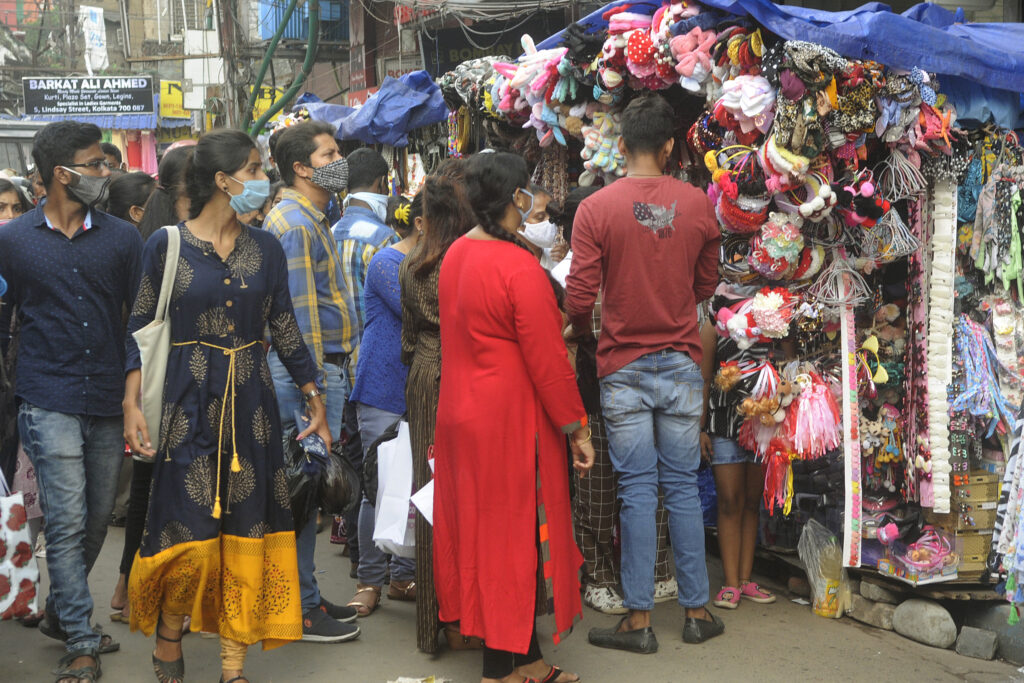
As coronavirus cases spike in the east India state of West Bengal, the Calcutta High Court has restricted visitors’ access to shrines during an important Hindu festival this month.
The court is denying visitors entry to Durga Puja pandals, the temporary shrines set up to venerate the goddess Durga during the festival that runs from Oct. 22-26.
The annual Durga Puja festival celebrates the victory of goddess Durga over Mahishasura, the buffalo demon. According to Hindu mythology, the festival also heralds the visit of the goddess and her children to her birth home on Earth. The festivities have their roots in colonial Bengal.
In 1757, the East India Company, under Colonel Robert Clive, defeated Siraj-ud-Daulah, the last independent nawab (viceroy) of Bengal. After his victory, Clive wanted to pray for his success, but there was no church in Calcutta. Clive’s interpreter and clerk asked him to pay his offerings to goddess Durga instead. Ever since, the festival has increased in size and stature, and is celebrated by the Indian diaspora.
This year, while most of the festivities have been curtailed due to the pandemic, the High Court’s decision is another setback for visitors. However, doctors have expressed concern about a possible spike in Covid-19 cases after the Durga Puja celebrations. Some wrote to Chief Minister Mamata Banerjee on Oct. 6, asking her to take stern measures.
“A terrible scenario can be expected in West Bengal after Durga Puja and we are already headed in that direction as the number of cases has been steadily rising since the last month, as the pre-puja shopping continues,” said Dr. Sreya Bhattacharya.
As of Oct. 19, there were 321,036 Covid-19 cases in West Bengal, with nearly 4,000 new cases; 281,053 had recovered. Calcutta had 69,844 cases, an increase of 813 cases and 13 more deaths.
Bhattacharya expects the state will face the same fate as that of Kerala, where a 126 percent rise in active Covid-19 cases was seen after the Onam festival. She suggested changes for this year’s Durga Puja.
“Instead of celebrating it in the conventional way, they could arrange cultural programs and other festivities which could be streamed online,” she said. “People must carry sanitizer bottles and sanitize their hands frequently. They should avoid excessively crowded pandals and eating at street vendors.”
After a plea was filed in the High Court seeking ways to stop the celebrations, the court questioned the state government’s move of donating INR 50,000 ($681) to the puja committees. A Public Interest Litigation (PIL) was filed, claiming that the money was meant to lure voters, and that the celebrations should be kept at a minimum.
“As the doctors mentioned about a ‘tsunami of Covid-19,’ people will have to be very aware of that. There are different phases and protocols to unlock a state,” said Sabyasachi Chatterjee, an advocate at the Calcutta High Court who filed the PIL. “The number of cases is increasing daily, and we are seeing a surge due to Durga Puja. The government cannot allow thinking about crowd management. It is a different situation.”
He warned it will be difficult to implement the rules and regulations as there will be thousands of people on the streets.

The state Cabinet on Oct. 12 moved to increase the number of beds in government hospitals by 50 percent and to reduce the rates for Covid tests in the private sector. They also asked the West Bengal Clinical Regulatory Commission to trim ambulance charges.
Most of the Puja committees have agreed to follow the guidelines during the celebrations, including Aboshor Sarbojonin Club, a Durga Puja organizing group in North Kolkata.
“We have sanitizers, infrared thermometers, oxygen cylinders and ambulances at all the entry and exit points of the pandal. There will be no one allowed during the Anjali — offering to the goddess — except the core members. We have a team which will constantly make the visitors aware through microphones. The immersion of the idol on the last day has been canceled this year,” said Shyamal Nag Das, former club secretary.
Das said Durga Puja cannot be stopped in Bengal as a massive number of migrant laborers earn their living by working in different pandals.
“There are approximately 3,500 Pujas happening across Kolkata, and on an average 700,000 people are dependent on them to earn their living,” he said. “These Pujas are a source of income in and around the state during these times. A revenue of INR 50,000 crore is in rotation in the market and many workers benefit from this. If this comes to a halt, people will die of hunger.”
He said that if Eid was allowed to be celebrated during the lockdown, Durga Puja should be allowed as well.
(Edited by Uttaran Das Gupta and Judy Isacoff.)
The post Calcutta High Court Denies Access to Festival Shrines Amid Spike in Covid Cases appeared first on Zenger News.
